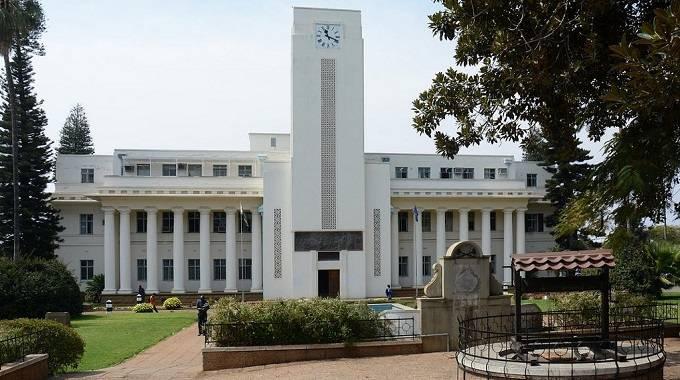News / National
BCC resumes sorghum production
28 May 2025 at 09:54hrs |
0 Views

The Bulawayo City Council (BCC) has resumed commercial sorghum farming at Aisleby Farm after a five-year hiatus, aiming to diversify income sources and reduce dependence on ratepayer funding. The initiative, led by the council's Business and Investment Committee, saw 105 hectares of sorghum planted this season, with harvesting expected to commence this week following a successful trial.
Council's Business and Investment Committee Chairperson, Councillor Mxolisi Mahlangu, revealed that the last commercial sorghum crop was planted in 2019. This year's promising harvest is set to generate significant revenue, with Ingwebu Breweries confirmed as the main buyer.
Last week, Clr Mahlangu, along with fellow councillors Ntando Ndlovu and Ashton Mhlanga and Acting Town Clerk Engineer Sikhumbuzo Ncube, visited Aisleby Farm to inspect the healthy sorghum fields ready for harvest.
The sorghum project forms part of a broader portfolio of strategic business units under BCC, including Aisleby Farm's livestock operations, local beer gardens, swimming pools, the Mzilikazi Art, Craft and Pottery Centre, Parks Nursery, and the Council Caravan Park.
Clr Mahlangu said the council invested US$13,000 for land preparation and planting, with a further US$7,000 needed for harvesting. A combine harvester will be hired from the Agricultural and Rural Development Authority (Arda) to facilitate the process.
"The first step was to consult Ingwebu Breweries to secure their commitment as the primary buyer and to identify the seed variety best suited for their production," Clr Mahlangu explained.
"With BCC's tractors out of service, we engaged Arda for equipment hire to prepare the land, which led to the successful planting of 105 hectares."
The crop, now about 60 percent mature, is projected to bring in approximately US$45,000 in profit upon sale to Ingwebu Breweries.
"Harvesting could start this week, pending council fund approval. Total production costs stand at around US$20,000, with expected profits of US$45,000," Mahlangu added.
During a visit by Zimpapers reporters, the expansive sorghum fields were seen flourishing under favourable conditions.
Clr Mahlangu stressed the need for such innovative business ventures to lessen BCC's financial reliance on ratepayers, noting the growing challenges posed by unpaid or late payments from residents.
"In today's economic climate, the council must be creative in generating revenue. Many residents struggle to pay rates fully or on time, yet the council must maintain operations, service delivery, and staff salaries," he said.
The decision to revive sorghum production followed observations that portions of Aisleby Farm had been lying idle and underutilised.
"We cannot allow farm workers to depend solely on ratepayer funds for salaries when the farm has the potential to be self-sustaining and contribute financially to the council," Clr Mahlangu remarked.
Councillors touring the farm lauded the integrated farming model, which also includes animal husbandry with a livestock population of 500 cattle and over 400 goats.
"Starting with 105 hectares as a trial, given the land's five-year dormancy, this season's excellent crop performance is highly encouraging. We aim to expand to over 200 hectares next season," Mahlangu said.
"The ultimate goal is to develop Aisleby Farm into a thriving enterprise that can help cover the council's wage bill, easing the financial load on ratepayers and freeing funds for critical service delivery," he concluded.
Council's Business and Investment Committee Chairperson, Councillor Mxolisi Mahlangu, revealed that the last commercial sorghum crop was planted in 2019. This year's promising harvest is set to generate significant revenue, with Ingwebu Breweries confirmed as the main buyer.
Last week, Clr Mahlangu, along with fellow councillors Ntando Ndlovu and Ashton Mhlanga and Acting Town Clerk Engineer Sikhumbuzo Ncube, visited Aisleby Farm to inspect the healthy sorghum fields ready for harvest.
The sorghum project forms part of a broader portfolio of strategic business units under BCC, including Aisleby Farm's livestock operations, local beer gardens, swimming pools, the Mzilikazi Art, Craft and Pottery Centre, Parks Nursery, and the Council Caravan Park.
Clr Mahlangu said the council invested US$13,000 for land preparation and planting, with a further US$7,000 needed for harvesting. A combine harvester will be hired from the Agricultural and Rural Development Authority (Arda) to facilitate the process.
"The first step was to consult Ingwebu Breweries to secure their commitment as the primary buyer and to identify the seed variety best suited for their production," Clr Mahlangu explained.
"With BCC's tractors out of service, we engaged Arda for equipment hire to prepare the land, which led to the successful planting of 105 hectares."
The crop, now about 60 percent mature, is projected to bring in approximately US$45,000 in profit upon sale to Ingwebu Breweries.
During a visit by Zimpapers reporters, the expansive sorghum fields were seen flourishing under favourable conditions.
Clr Mahlangu stressed the need for such innovative business ventures to lessen BCC's financial reliance on ratepayers, noting the growing challenges posed by unpaid or late payments from residents.
"In today's economic climate, the council must be creative in generating revenue. Many residents struggle to pay rates fully or on time, yet the council must maintain operations, service delivery, and staff salaries," he said.
The decision to revive sorghum production followed observations that portions of Aisleby Farm had been lying idle and underutilised.
"We cannot allow farm workers to depend solely on ratepayer funds for salaries when the farm has the potential to be self-sustaining and contribute financially to the council," Clr Mahlangu remarked.
Councillors touring the farm lauded the integrated farming model, which also includes animal husbandry with a livestock population of 500 cattle and over 400 goats.
"Starting with 105 hectares as a trial, given the land's five-year dormancy, this season's excellent crop performance is highly encouraging. We aim to expand to over 200 hectares next season," Mahlangu said.
"The ultimate goal is to develop Aisleby Farm into a thriving enterprise that can help cover the council's wage bill, easing the financial load on ratepayers and freeing funds for critical service delivery," he concluded.
Source - the chronicle
Join the discussion
Loading comments…




































